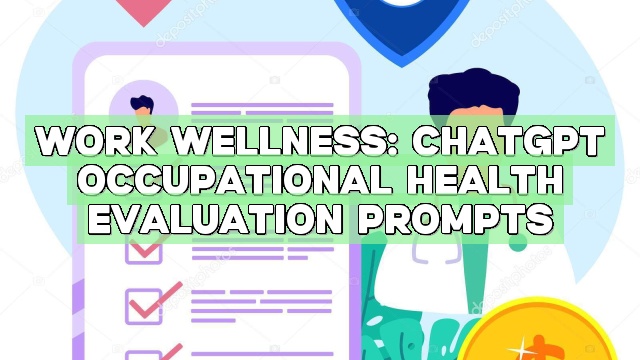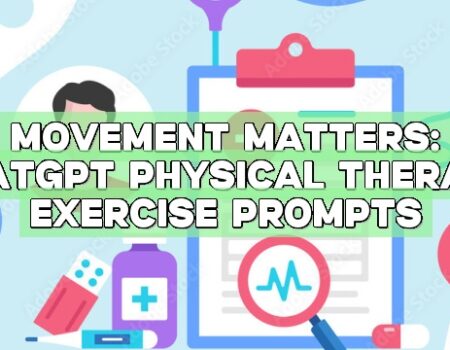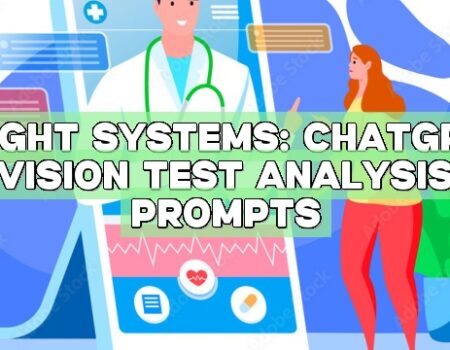Work wellness is a crucial aspect of occupational health, and ChatGPT offers a range of prompts specifically designed to evaluate and improve employee well-being in the workplace. These prompts, tailored to the unique needs of the healthcare industry, provide valuable insights, recommendations, and content to assist healthcare professionals in saving time, increasing efficiency, and delivering better patient care.
The healthcare industry is constantly evolving, and the integration of AI-powered chatbots like ChatGPT is revolutionizing the way healthcare professionals operate. By utilizing these prompts, healthcare professionals can harness the power of AI to transform their practice and achieve better patient outcomes.
Guidelines for Crafting Effective Prompts
When crafting prompts for AI chatbots like ChatGPT, it is essential to follow certain guidelines to ensure the generation of meaningful responses. Clear and concise prompts are crucial, and it is important to state expectations, requirements, and parameters such as format and word count. Open-ended questions should be used to encourage thoughtful and comprehensive answers, avoiding simple “yes” or “no” responses. It is also important to keep the language simple and easily understandable, avoiding complex jargon that may confuse the chatbot. Providing context through background information or additional details helps the chatbot understand the subject matter and generate accurate responses. Additionally, iteration and refinement of prompts are important to find what works best for specific needs and make adjustments as necessary.
Ensuring Patient Privacy with ChatGPT
One important consideration when using ChatGPT is patient privacy. While OpenAI encrypts all data inputted into ChatGPT, it is crucial to ensure compliance with data protection regulations like HIPAA. It is recommended to verify if a third-party chatbot provider, like OpenAI, complies with HIPAA or similar regulations. To avoid potential privacy breaches, it is advisable to refrain from including personally identifiable information (PHI) in prompts submitted to AI chatbots.
Key Takeaways
- Clear and concise prompts are crucial for generating meaningful responses from AI chatbots like ChatGPT.
- Open-ended questions should be used to encourage thoughtful and comprehensive answers.
- Keeping the language simple and providing context helps the chatbot understand the subject matter and generate accurate responses.
- Compliance with data protection regulations like HIPAA is essential to ensure patient privacy when using ChatGPT.
- Avoiding the inclusion of personally identifiable information (PHI) in prompts submitted to AI chatbots can prevent potential privacy breaches.
The Power of AI in the Healthcare Industry
The healthcare industry is constantly evolving, and the integration of AI-powered chatbots like ChatGPT is revolutionizing the way healthcare professionals operate. By utilizing these prompts, healthcare professionals can harness the power of AI to transform their practice and achieve better patient outcomes.
When crafting prompts for AI chatbots like ChatGPT, it is essential to follow certain guidelines to ensure the generation of meaningful responses. Clear and concise prompts are crucial, and it is important to state expectations, requirements, and parameters such as format and word count. Open-ended questions should be used to encourage thoughtful and comprehensive answers, avoiding simple “yes” or “no” responses. It is also important to keep the language simple and easily understandable, avoiding complex jargon that may confuse the chatbot. Providing context through background information or additional details helps the chatbot understand the subject matter and generate accurate responses. Additionally, iteration and refinement of prompts are important to find what works best for specific needs and make adjustments as necessary.
One important consideration when using ChatGPT is patient privacy. While OpenAI encrypts all data inputted into ChatGPT, it is crucial to ensure compliance with data protection regulations like HIPAA. It is recommended to verify if a third-party chatbot provider, like OpenAI, complies with HIPAA or similar regulations. To avoid potential privacy breaches, it is advisable to refrain from including personally identifiable information (PHI) in prompts submitted to AI chatbots.
Prompts for Occupational Health Evaluation and Work Wellness
Now let’s explore the specific prompts related to work wellness and occupational health evaluation in ChatGPT:
Patient communication
Effective patient communication is vital for promoting work wellness. ChatGPT prompts can assist healthcare professionals in explaining medical conditions and treatments to newly diagnosed patients, providing treatment options, and summarizing causes and risk factors for various medical conditions. These prompts encourage clear and concise explanations while maintaining a maximum word count for each response.
Addressing patient concerns and questions
Patients often have concerns about the side effects of prescribed medications, the cost of treatments, and recommended medical procedures. ChatGPT prompts can generate responses that address these concerns, provide reassurance, and offer information about financial assistance options or the procedure itself. Limiting the word count ensures concise and informative responses.
Creating empathetic and supportive messages
Empathy and support are essential for promoting work wellness. ChatGPT prompts can help healthcare professionals craft empathetic messages for patients who have received serious medical diagnoses, messages of encouragement for patients managing chronic conditions, and messages to help patients stay motivated and engaged in their treatment plans. These prompts ensure the generation of empathetic and supportive messages within a specific word count.
Medical documentation
Effective medical documentation is crucial for evaluating work wellness. ChatGPT prompts can assist in writing case summaries, patient histories, and key findings from diagnostic tests. They can also help in drafting progress notes, treatment plans, referral letters, discharge summaries, and post-discharge care instructions. These prompts ensure concise and accurate documentation within specific word limits.
Medical research
Staying up to date with medical research is essential for enhancing work wellness. ChatGPT prompts can generate summaries of research articles, clinical trials, and recent studies on various medical conditions. They can also help in generating research topics for further study and suggesting innovative approaches. These prompts encourage the generation of concise and informative summaries or topics within specific word limits.
By utilizing the power of ChatGPT and these specific prompts, healthcare professionals can effectively evaluate and improve work wellness in the healthcare industry. By providing accurate and comprehensive information, these prompts enable healthcare professionals to save time, increase efficiency, and deliver better patient care. The integration of AI-powered chatbots like ChatGPT will continue to revolutionize occupational health and drive positive outcomes in the healthcare industry.
Guidelines for Crafting Effective Prompts
When crafting prompts for AI chatbots like ChatGPT, it is essential to follow certain guidelines to ensure the generation of meaningful responses. Clear and concise prompts are crucial, and it is important to state expectations, requirements, and parameters such as format and word count. Open-ended questions should be used to encourage thoughtful and comprehensive answers, avoiding simple “yes” or “no” responses. It is also important to keep the language simple and easily understandable, avoiding complex jargon that may confuse the chatbot. Providing context through background information or additional details helps the chatbot understand the subject matter and generate accurate responses. Additionally, iteration and refinement of prompts are important to find what works best for specific needs and make adjustments as necessary.
The use of clear and concise prompts ensures that the chatbot understands the desired response. It is essential to state the expectations, requirements, and parameters of the response. For example, specifying the format, word count, and preferred language helps the chatbot generate accurate and relevant responses. Concise prompts also save time and ensure that the chatbot generates a response within a reasonable timeframe.
Open-ended questions encourage the chatbot to provide more comprehensive answers to employees’ concerns. Rather than asking simple “yes” or “no” questions, open-ended questions encourage chatbots to provide in-depth responses that address a broad range of employee concerns. This approach assists in generating more meaningful and helpful responses.
Using plain and simple language in prompts helps the chatbot understand the subject matter and provide more accurate responses. Employees’ comprehension is crucial, and using words or phrases that employees might not understand can lead to confusion and inaccurate responses. Using straightforward language ensures that the message is understood and interpreted accurately.
Providing context for prompts is necessary to ensure accurate responses. Background information or additional details provide the chatbot with the necessary information to generate accurate and relevant responses. It also ensures that the chatbot understands the context of the employee’s concerns. This approach results in more accurate and appropriate responses.
Iteration and refinement of prompts are essential to ensure that the chatbot provides meaningful and helpful responses. Healthcare professionals should continually review and refine the prompts to improve their relevance and accuracy. Adjustments can be made as necessary based on employee feedback and experience.
Ensuring Patient Privacy with ChatGPT
One important consideration when using ChatGPT is patient privacy. While OpenAI encrypts all data inputted into ChatGPT, it is crucial to ensure compliance with data protection regulations like HIPAA. It is recommended to verify if a third-party chatbot provider, like OpenAI, complies with HIPAA or similar regulations. To avoid potential privacy breaches, it is advisable to refrain from including personally identifiable information (PHI) in prompts submitted to AI chatbots.
Protecting patient privacy is essential in the healthcare industry, and healthcare professionals must be vigilant when using AI-powered chatbots like ChatGPT. Data protection regulations like HIPAA aim to safeguard patient privacy by establishing standards for the storage, use, and transmission of sensitive patient information. Compliance with these regulations ensures that patient privacy is maintained and that healthcare professionals avoid potential legal and ethical violations.
It is also important to note that AI chatbots can be vulnerable to privacy breaches, similar to other digital platforms. To minimize the risk of such breaches, healthcare professionals should ensure that the prompts submitted to ChatGPT do not contain any personally identifiable information. PHI includes any information that can identify an individual, such as names, dates of birth, social security numbers, or medical record numbers. By avoiding the inclusion of PHI, healthcare professionals can minimize the risk of inadvertent privacy breaches.
In conclusion, protecting patient privacy is an essential component of using ChatGPT and other AI-powered chatbots in the healthcare industry. Compliance with data protection regulations like HIPAA and refraining from including personally identifiable information in prompts submitted to chatbots are critical steps in safeguarding patient privacy. By implementing these measures, healthcare professionals can effectively evaluate and improve work wellness in the healthcare industry while maintaining patient privacy and confidentiality.
Work Wellness: ChatGPT Occupational Health Evaluation Prompts
Effective patient communication is vital for promoting work wellness. ChatGPT prompts can assist healthcare professionals in evaluating and improving employee well-being in the workplace, providing valuable insights, recommendations, and content to save time, increase efficiency, and deliver better patient care. The integration of AI-powered chatbots like ChatGPT is revolutionizing the way healthcare professionals operate, and these prompts, tailored to the unique needs of the healthcare industry, play a crucial role in driving positive outcomes.
The Power of AI in the Healthcare Industry
The healthcare industry is constantly evolving, and the integration of AI-powered chatbots like ChatGPT is revolutionizing the way healthcare professionals operate. By utilizing these prompts, healthcare professionals can harness the power of AI to transform their practice and achieve better patient outcomes.
Guidelines for Crafting Effective Prompts
When crafting prompts for AI chatbots like ChatGPT, it is essential to follow certain guidelines to ensure the generation of meaningful responses. Clear and concise prompts are crucial, and it is important to state expectations, requirements, and parameters such as format and word count. Open-ended questions should be used to encourage thoughtful and comprehensive answers, avoiding simple “yes” or “no” responses. It is also important to keep the language simple and easily understandable, avoiding complex jargon that may confuse the chatbot. Providing context through background information or additional details helps the chatbot understand the subject matter and generate accurate responses. Additionally, iteration and refinement of prompts are important to find what works best for specific needs and make adjustments as necessary.
Ensuring Patient Privacy with ChatGPT
One important consideration when using ChatGPT is patient privacy. While OpenAI encrypts all data inputted into ChatGPT, it is crucial to ensure compliance with data protection regulations like HIPAA. It is recommended to verify if a third-party chatbot provider, like OpenAI, complies with HIPAA or similar regulations. To avoid potential privacy breaches, it is advisable to refrain from including personally identifiable information (PHI) in prompts submitted to AI chatbots.
Patient Communication Prompts
Effective patient communication is vital for promoting work wellness. ChatGPT prompts can assist healthcare professionals in explaining medical conditions and treatments to newly diagnosed patients, providing treatment options, and summarizing causes and risk factors for various medical conditions. These prompts encourage clear and concise explanations while maintaining a maximum word count for each response.
Addressing Patient Concerns and Questions
Patients often have concerns about the side effects of prescribed medications, the cost of treatments, and recommended medical procedures. ChatGPT prompts can generate responses that address these concerns, provide reassurance, and offer information about financial assistance options or the procedure itself. Limiting the word count ensures concise and informative responses.
Creating Empathetic and Supportive Messages
Empathy and support are essential for promoting work wellness. ChatGPT prompts can help healthcare professionals craft empathetic messages for patients who have received serious medical diagnoses, messages of encouragement for patients managing chronic conditions, and messages to help patients stay motivated and engaged in their treatment plans. These prompts ensure the generation of empathetic and supportive messages within a specific word count.
Medical Documentation Prompts
Effective medical documentation is crucial for evaluating work wellness. ChatGPT prompts can assist in writing case summaries, patient histories, and key findings from diagnostic tests. They can also help in drafting progress notes, treatment plans, referral letters, discharge summaries, and post-discharge care instructions. These prompts ensure concise and accurate documentation within specific word limits.
Medical Research Prompts
Staying up to date with medical research is essential for enhancing work wellness. ChatGPT prompts can generate summaries of research articles, clinical trials, and recent studies on various medical conditions. They can also help in generating research topics for further study and suggesting innovative approaches. These prompts encourage the generation of concise and informative summaries or topics within specific word limits.
H2: Addressing Patient Concerns and Questions
Patients often have concerns about the side effects of prescribed medications, the cost of treatments, and recommended medical procedures. ChatGPT prompts can generate responses that address these concerns, provide reassurance, and offer information about financial assistance options or the procedure itself. Limiting the word count ensures concise and informative responses.
When using ChatGPT prompts to address patient concerns and questions, it is important to provide clear and concise prompts that are easy for the chatbot to understand. Open-ended questions should be used to encourage comprehensive responses. Using simple language is crucial for ensuring patients can easily understand the response provided by the chatbot.
For example, a prompt for addressing concerns about medication side effects might be:
Please explain any potential side effects of the prescribed medication and how they might affect daily activities.
ChatGPT is able to generate a response that provides information about the most common side effects of the medication, how often they occur, and what actions patients can take if they experience them. This information can help patients feel more prepared and informed about their treatment.
Another example of a prompt to address concerns about treatment cost might be:
Can you provide information about financial assistance options for the recommended treatment?
ChatGPT can generate a response that provides information about insurance coverage, government programs, and other financial assistance options that the patient may be eligible for. By providing this information, the chatbot can help alleviate the financial burden that can often accompany medical treatments.
Overall, ChatGPT prompts can address patient concerns and questions about side effects, treatment costs, and procedures, providing them with valuable information and reassurance. This enables healthcare professionals to improve the patient experience and promote work wellness, ultimately leading to better patient outcomes.
Creating Empathetic and Supportive Messages
Empathy and support are essential for promoting work wellness. ChatGPT prompts can help healthcare professionals craft empathetic messages for patients who have received serious medical diagnoses, messages of encouragement for patients managing chronic conditions, and messages to help patients stay motivated and engaged in their treatment plans. These prompts ensure the generation of empathetic and supportive messages within a specific word count.
| Prompt Type | Prompt Example |
|---|---|
| Encouraging messages | “You are doing an excellent job managing your symptoms. Keep up the good work!” |
| Motivational messages | “Your hard work and dedication to your treatment plan are paying off. Stay focused and keep moving forward.” |
| Sympathetic messages | “I understand this is a difficult time for you. I’m here to support you in any way I can.” |
By using these prompts, healthcare professionals can create messages that connect with patients on an emotional level, providing a sense of comfort and reassurance. These messages can help patients stay motivated to manage their conditions and stay engaged in their treatment plans. By fostering a culture of empathy and support in the workplace, healthcare professionals can promote work wellness and provide better patient care.
Medical Documentation Prompts
Effective medical documentation is crucial for evaluating work wellness. ChatGPT prompts can assist healthcare professionals in crafting accurate and concise documentation, minimizing errors and promoting better patient care. These prompts cover a range of documentation needs, from case summaries and patient histories to progress notes, treatment plans, referral letters, discharge summaries, and post-discharge care instructions.
When crafting prompts for medical documentation, it is important to provide clear and specific instructions related to word count, format, and content. ChatGPT prompts can help healthcare professionals draft case summaries by providing a detailed list of key information to include, such as patient demographics, medical history, presenting symptoms, diagnostic tests, and treatment plans. These prompts ensure the generation of accurate and concise summaries, minimizing errors and inaccuracies.
For progress notes, it is crucial to include relevant information related to the patient’s condition, treatment plan, and response to treatment. ChatGPT prompts can assist healthcare professionals in generating progress notes that cover all necessary information, including vital signs, lab test results, medication changes, and any adverse effects noted. These prompts encourage the inclusion of specific and relevant information, making it easier for healthcare professionals to track the patient’s progress and adjust treatment plans accordingly.
For treatment plans, referrals, and discharge summaries, ChatGPT prompts can assist healthcare professionals in developing clear and concise documents that outline the patient’s condition, treatment plan, and any follow-up care that may be necessary. These prompts encourage the inclusion of specific information related to the patient’s diagnosis, any tests or procedures that may be required, and follow-up appointments or care instructions. By utilizing these prompts, healthcare professionals can generate accurate and comprehensive documentation that promotes better patient care and improves work wellness in the healthcare industry.
The Importance of Staying up to Date with Medical Research
Staying up to date with medical research is essential for enhancing work wellness. As the healthcare industry evolves, new discoveries, treatments, and protocols are continually emerging. Healthcare professionals must remain informed to provide accurate and up-to-date care to their patients.
ChatGPT prompts make it easy to stay current with medical research by generating summaries of research articles, clinical trials, and recent studies on various medical conditions. These prompts can also help in generating research topics for further study and suggesting innovative approaches.
By utilizing ChatGPT’s medical research prompts, healthcare professionals can save time and increase efficiency in reviewing and analyzing important research findings. These prompts encourage the generation of concise and informative summaries or research topics within specific word limits.
Overall, staying up to date with the latest medical research is essential for enhancing work wellness. By utilizing ChatGPT’s medical research prompts, healthcare professionals can remain informed, improve patient outcomes, and drive positive change in the healthcare industry.
FAQ
Q: What are ChatGPT prompts?
A: ChatGPT prompts are specific instructions or questions provided to the AI chatbot to generate meaningful responses. These prompts are tailored to evaluate and improve employee well-being in the workplace.
Q: How can ChatGPT prompts benefit the healthcare industry?
A: ChatGPT prompts can assist healthcare professionals in saving time, increasing efficiency, and delivering better patient care. They provide valuable insights, recommendations, and content specific to the unique needs of the healthcare industry.
Q: What guidelines should be followed when crafting ChatGPT prompts?
A: It is important to use clear and concise prompts, state expectations and requirements, use open-ended questions, and keep the language simple and easily understandable. Providing context through additional details or background information is also recommended.
Q: How can patient privacy be ensured when using ChatGPT?
A: While OpenAI encrypts all data, it is crucial to ensure compliance with data protection regulations like HIPAA. It is recommended to verify if third-party chatbot providers comply with such regulations and refrain from including personally identifiable information in prompts.
Q: What types of prompts are available for patient communication?
A: ChatGPT prompts can assist healthcare professionals in explaining medical conditions, treatments, and providing information to newly diagnosed patients. They encourage clear and concise explanations within specific word limits.
Q: How can ChatGPT prompts address patient concerns and questions?
A: ChatGPT prompts can provide responses that address concerns about medication side effects, treatment costs, and medical procedures. They can also offer information about financial assistance options. The prompts ensure concise and informative answers.
Q: How can ChatGPT prompts facilitate the creation of empathetic and supportive messages?
A: ChatGPT prompts can help healthcare professionals craft empathetic messages for patients with serious medical diagnoses, messages of encouragement for those managing chronic conditions, and messages to support patient motivation. These prompts ensure the generation of empathetic and supportive messages within a specific word count.
Q: What role do ChatGPT prompts play in medical documentation?
A: ChatGPT prompts assist in writing case summaries, patient histories, progress notes, discharge summaries, and other medical documents. They help healthcare professionals create concise and accurate documentation within specific word limits.
Q: How can ChatGPT prompts aid in medical research?
A: ChatGPT prompts can generate summaries of research articles, clinical trials, and recent studies. They can also suggest research topics for further study and innovative approaches. These prompts encourage the generation of concise and informative summaries or topics within specific word limits.









